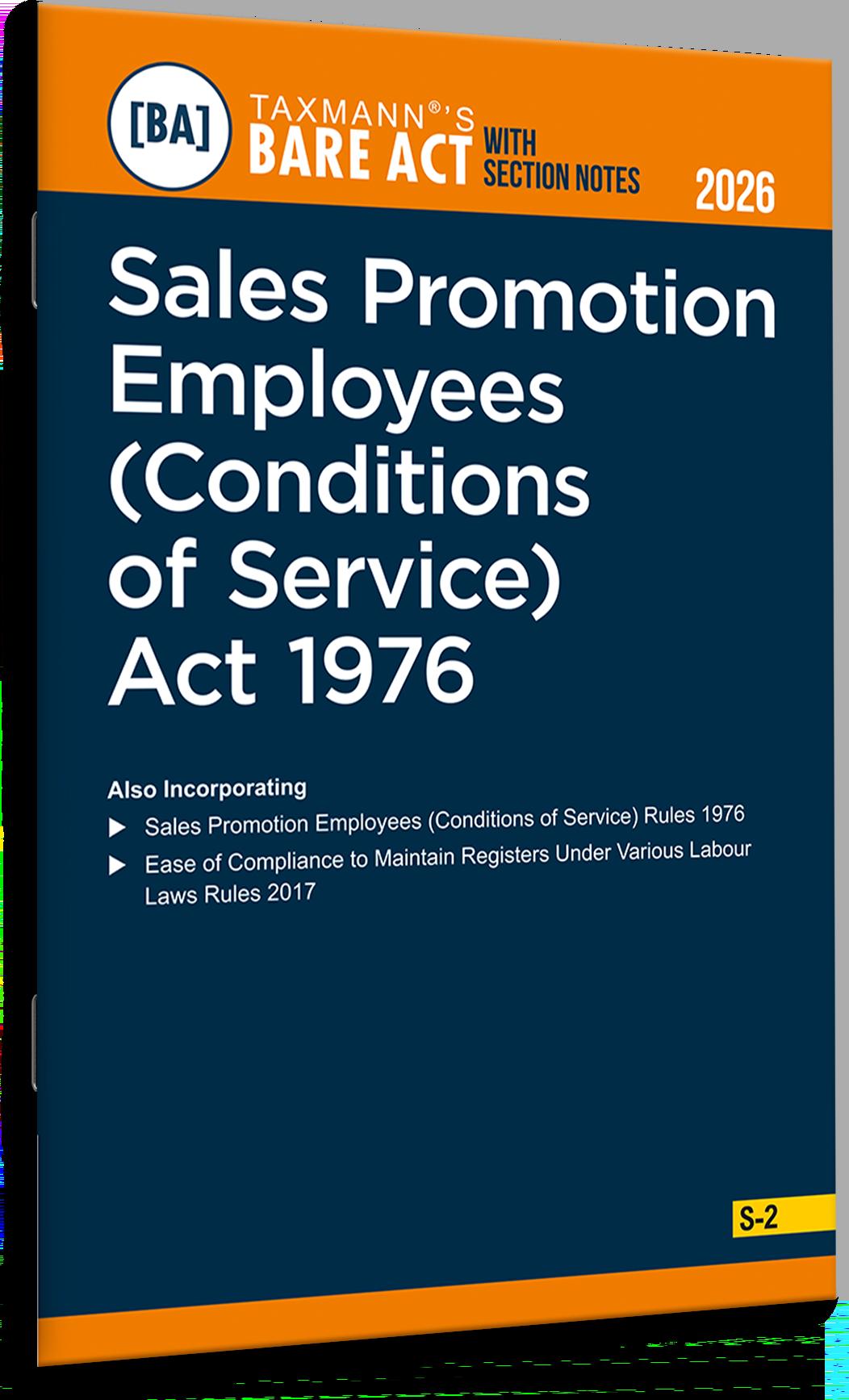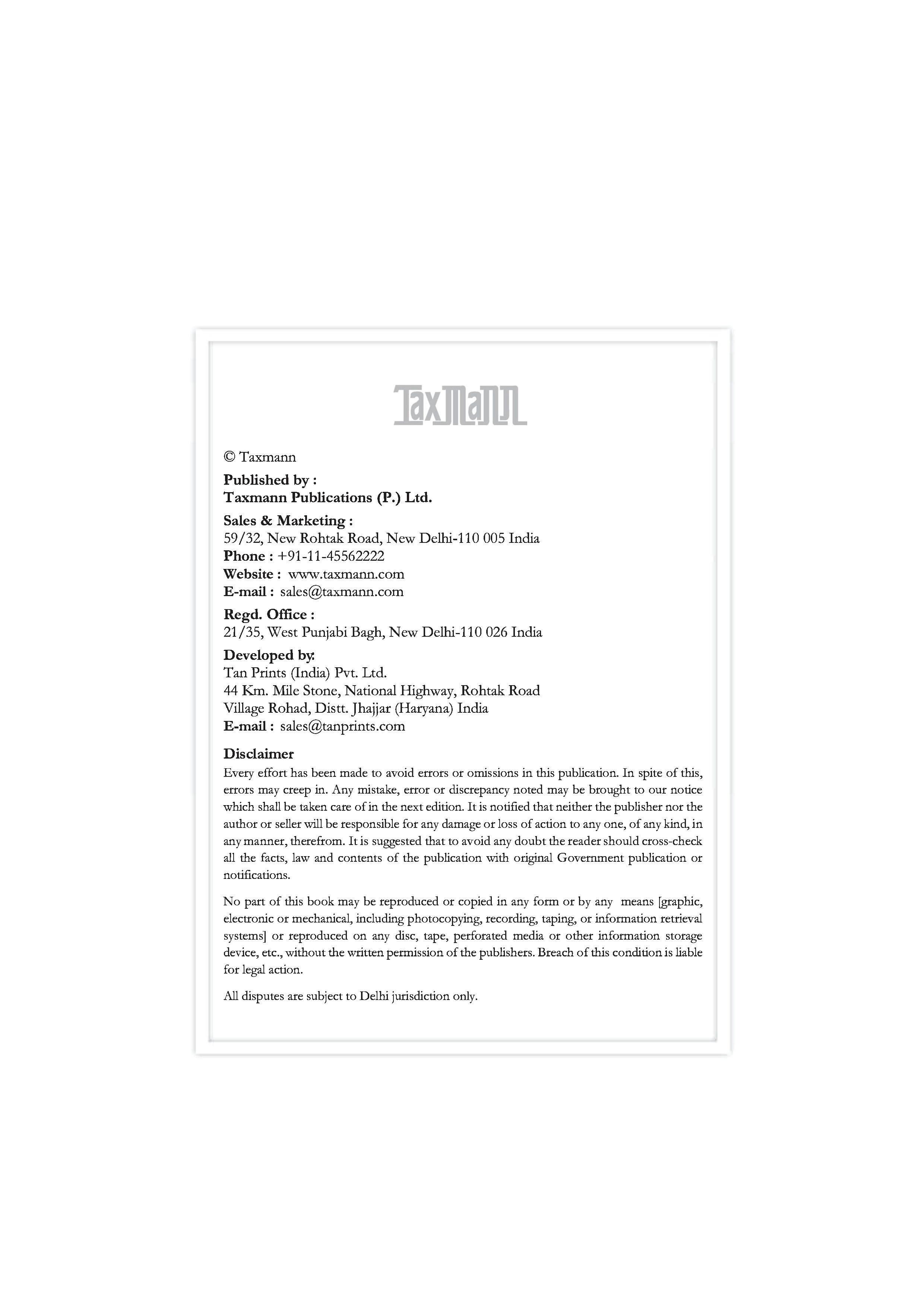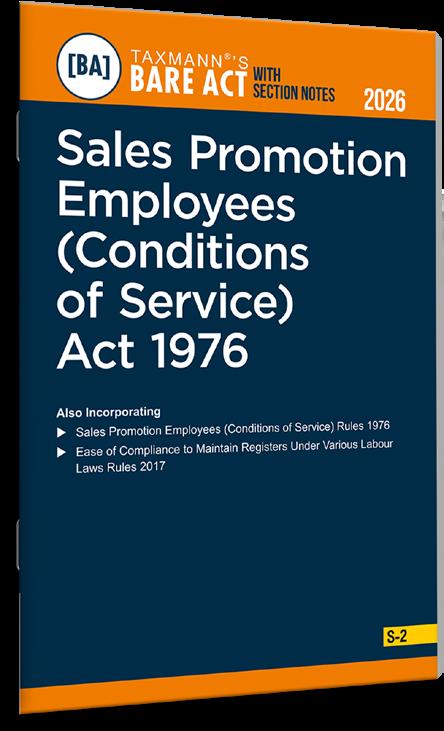Sales Promotion Employees (Conditions of Service) Act, 1976*
[11 OF 1976]1
An Act to regulate certain conditions of service of sales promotion employees in certain establishments.
BE it enacted by Parliament in the Twenty-sixth Year of the Republic of India as follows:—
Short title, extent, commencement and application.
1. (1) This Act may be called the Sales Promotion Employees (Conditions of Service) Act, 1976.
(2)It extends to the whole of India.
(3)It shall come into force on such date2 as the Central Government may, by notification in the Official Gazette, appoint and different dates may be appointed for different States.
(4)It shall apply in the first instance to every establishment engaged in pharmaceutical industry.
(5)The Central Government may, by notification in the Official Gazette, apply the provisions of this Act, with effect from such date as may be specified in the notification, to any other establishment engaged in any notified industry. Definitions.
2. In this Act, unless the context otherwise requires, —
(a)“establishment” means an establishment engaged in pharmaceutical industry or in any notified industry;
(b)“notified industry” means an industry declared as such under section 3;
(c)“prescribed” means prescribed by rules made under this Act;
1. Dated 25-1-1976.
2. With effect from 6-3-1976 [Vide Notification No. S.O. 176(E), dated 16-3-1976]
*Shall be repealed by the Occupational Safety, Health and Working Conditions Code, 2020, with effect from a date yet to be notified.
S. 2 SALES PROMOTION EMPLOYEES (CONDITIONS OF SERVICE) ACT, 1976 2
3[(d) “sales promotion employees” means any person by whatever name called (including an apprentice) employed or engaged in any establishment for hire or reward to do any work relating to promotion of sales or business, or both, but does not include any such person—
(i) who, being employed or engaged in a supervisory capacity, draws wages exceeding sixteen hundred rupees per mensem; or
(ii) who is employed or engaged mainly in a managerial or administrative capacity.
Explanation.—For the purposes of this clause, the wages per mensem of a person shall be deemed to be the amount equal to thirty times his total wages (whether or not including, or comprising only of, commission) in respect of the continuous period of his service falling within the period of twelve months immediately preceding the date with reference to which the calculation is to be made, divided by the number of days comprising that period of service;]
(e) all words and expressions used but not defined in this Act and defined in the Industrial Disputes Act, 1947 (14 of 1947), shall have the meanings respectively assigned to them in that Act.
COMMENTS
SECTION NOTES
2.1 Definition of “Sales Promotion Employees”
Sales promotion employees means:
Any person, including an apprentice, who is employed or engaged in an establishment.
The employment or engagement is for hire or reward.
The work relates to the promotion of sales or business, or both. Sales promotion employees does not include:
Any person employed or engaged in a supervisory capacity whose wages exceed sixteen hundred rupees per mensem.
3. Substituted by the Sales Promotion Employees (Conditions of Service) Amendment Act, 1986, w.e.f. 6-5-1987. Prior to substitution, clause (d) read as under:–‘(d) “sales promotion employed” means any person by whatever name called (including an apprentice employed or engaged in any establishment for hire or reward to do any work relating to promotion of sales or business, or both, and— (i) who draws wages (being wages, not including any commission) not exceeding seven hundred and fifty rupees per mensem; or (ii) who had drawn wages (being wages, including commission), or commission only, in either case, not exceeding nine thousand rupees in the aggregate in the twelve months immediately preceding the month in which this Act applies to such establishment and continues to draw such wages or commission, in the aggregate, not exceeding the amount aforesaid in a year, but does not include any such person who is employed or engaged mainly in a managerial or administrative capacity;’
2.2
SALES PROMOTION EMPLOYEES (CONDITIONS OF SERVICE) ACT,
1976 S. 2
Any person employed or engaged mainly in a managerial or administrative capacity.
Deemed wages calculation
For the purposes of this clause, the wages per mensem of a person are deemed to be an amount calculated in the following manner:
The total wages of the person are taken. This may or may not include, or may comprise only of, a commission.
This total is in respect of the continuous period of their service falling within the 12 months immediately preceding the date for calculation.
This total amount is multiplied by thirty.
The resulting product is then divided by the number of days comprising that period of service.
CASE LAWS
Managerial capacity – Not a sales promotion employee – The petitioner, initially appointed as a Medical Sales Representative in 1986, was promoted in February 1987 to District Manager and continued in that capacity until his termination in October 1988. He challenged the termination as an industrial dispute, claiming status as a sales promotion employee under section 2(d) of the 1976 Act. The Labour Court, after examining correspondence and duties performed, held that he was functioning in an administrative and managerial role, exercising effective supervision over medical sales representatives, and thus excluded from the definition of sales promotion employee. The Delhi High Court upheld this finding, noting that persons employed mainly in a managerial or administrative capacity fall outside the statutory scope of section 2(d) regardless of their sales-related work. The writ petition was dismissed – G.K. Jha v. Presiding Officer 2013 LAB. I. C. 3266.
Sales representative – Not a workman – In a dispute involving Junior Management Assistants and Sales Representatives of a paint manufacturing company, the Industrial Tribunal initially entertained claims relating to service conditions of both groups. The Sales Representative concerned was engaged mainly in canvassing for the promotion of the employer’s products and did not perform any work of the nature specified in section 2(s) of the Industrial Disputes Act, 1947 prior to its 1982 amendment. The Court held that even after the 1982 amendment, which introduced the term “operational” in section 2(s) of the Industrial Disputes Act and expanded “wages” in section 2(rr) to include commission on sales promotion, these changes did not bring such Sales Representatives within the statutory definition of “workman.” Consequently, he could not claim the benefits available to workmen under the Industrial Disputes Act, and the management’s challenge to the reference concerning him was upheld – Workmen, Addisons Paints and Chemicals Ltd. Assistants’ Association, Madras v. The Industrial Tribunal, Madras 1994 LAB. I. C. 1779.
Sales executive – Supervisory capacity and wage ceiling – Workman status upheld – The respondent joined the petitioner-management in 1982 as Sales Executive, was regularised in 1984, and served continuously until 2009, when he was refused employment without compliance with section 25F of the Industrial Disputes Act. The management contended he was a sales promotion employee in a supervisory role drawing Rs. 4,993 per month, exceeding the Rs. 1,600 ceiling under section 2(d)(i), and thus excluded from the definition of “workman.” The Tribunal found no evidence of managerial or excluded supervisory duties and held the dispute maintainable. The High Court noted that the wage ceiling in clause 2(d)(i) must be read with subsequent statutory enhancements under the Payment of Wages Act and that the salary drawn
S. 2
PROMOTION EMPLOYEES (CONDITIONS OF SERVICE) ACT, 1976 4
was within permissible limits. It upheld the Tribunal’s finding that the respondent was a workman and that the termination, effected without section 25F compliance and followed by engagement of another employee, was illegal. The writ petition was dismissed – Utkal Auto, Cuttack v. State of Orissa 2023 LAB. I. C. 4487.
Medical representative – Not workman prior to 1987 amendment – The respondent, appointed in 1973 as a Medical Representative to promote the petitioner-company’s pharmaceutical products in Allahabad, was terminated on 20 March 1985 while drawing Rs. 2,447 per month. The State Government referred the termination dispute to the Labour Court under the U.P. Industrial Disputes Act. The petitioner contended that the respondent, being a sales promotion employee earning above Rs. 750 per month prior to the 1986 amendment of the 1976 Act, was excluded from its definition and thus not a workman under the Industrial Disputes Act. The Court found his primary duties were canvassing and promoting sales, with incidental recovery work, and that the termination occurred before the amendment removing the wage ceiling. Holding that the respondent was outside the statutory definition of workman, the award of reinstatement was quashed – The Anglo-French Drug Co. (Eastern) Ltd., Bangalore v. Presiding Officer, Labour Court, Allahabad 2004 ALL. L. J. 1326.
Regional sales manager – Managerial/Administrative capacity – Not a workman – The respondent, appointed in May 2012 as a Regional Sales Manager and later confirmed, was transferred from Bareilly to Hyderabad in October 2013 but did not join at the new location, leading to his termination. The Labour Court held he was a sales promotion employee and a workman under industrial law, ordering reinstatement with back wages. On writ, the Court examined his appointment terms, duties, and evidence, noting he supervised Area Managers and Medical Representatives, was accountable for marketing operations and overall performance, and handled planning, budget allocation, evaluation of problems, and training – functions primarily managerial and administrative, involving supervisory responsibilities. As such, he fell within the exclusion under section 2(d) and could not be treated as a workman. The Labour Court’s award was quashed – Veritaz Health Care Ltd. v. State of U.P. 2017 (4) ALJ 338.
Sales promotion employee – Not in supervisory or managerial role – Workman status – The respondent, appointed in 2011 as a Senior Scientific Sales Executive, claimed his duties involved visiting doctors, medical stores, and distributors to promote the company’s products, without any supervisory, managerial, or administrative responsibilities. Upon termination, he raised an industrial dispute under section 2A(2) of the Industrial Disputes Act. The employer contended that clauses in his appointment letter indicated supervisory and managerial duties and relied on a contrary Madhya Pradesh High Court view in Novartis India Ltd. v. Vipin Srivastava. The Orissa High Court held that under section 2(d)(i) and (ii) of the 1976 Act, a sales promotion employee not engaged in supervisory, managerial, or administrative capacity remains within the statutory definition regardless of wages, and section 6 extends Industrial Disputes Act protections to such employees. The Court disagreed with the Madhya Pradesh view and upheld the respondent’s status as a workman, leaving the employer free to contest factual duties during adjudication – Sanofi India Ltd., Mumbai v. Sanofi Employees and Allied Workers Union, Ludhiana 2024 LAB. I. C. 765.
Medical representatives – Covered as workmen after 1987 amendment – The appellants, employed as Medical Representatives, had their services terminated, and their disputes were referred to the Labour Court-cum-Industrial Tribunal. The Tribunal, relying on H.R. Adyanthaya v. Sandoz (India) Ltd., held they were not “workmen” and dismissed the references. On appeal, the High Court noted that the 1976 Act, initially covering only sales promotion employees earning up to Rs. 750 per month, was amended in 1986 (effective 6 May 1987) to include all sales promotion employees without a wage
SALES PROMOTION EMPLOYEES (CONDITIONS OF SERVICE) ACT, 1976 S. 3
ceiling, except those in managerial or certain supervisory roles. Since the terminations occurred when the amended Act was in force, the appellants were covered under the Act and deemed workmen, making the Tribunal’s reliance on Adyanthaya misplaced as that case dealt with pre-amendment terminations. The orders of the Tribunal and Single Judge were set aside, and the matters remanded for decision on merits – Rajasthan Medical and Sales Representatives Union v. Industrial Research Institute Pvt. Ltd. 2000 LAB. I. C. 1963.
Medical representative – Not a workman – The respondent, appointed in 2004 as a Medical Representative in a pharmaceutical company, was terminated in 2013 following a separation package scheme. He raised an industrial dispute, and the Labour Court, relying on H.R. Adyanthaya v. Sandoz (India) Ltd., held him to be a workman and ordered reinstatement with back wages. On appeal, the Madhya Pradesh High Court examined his duties—visiting doctors, chemists, and stockists to promote sales—which required product knowledge and persuasive skills, not manual or clerical work. Even without subordinates, he was master of his own work and reported only on sales figures. Citing H.R. Adyanthaya correctly, the Court held that sales promotion employees like medical representatives do not fall within “workman” under section 2(s) of the Industrial Disputes Act and are excluded from section 2(d) of the 1976 Act if in a supervisory role exceeding the wage ceiling or in managerial/administrative capacity. The Labour Court and Single Bench orders were set aside – Novartis India Limited v. Vipin Shrivastava AIRONLINE 2018 MP 1529.
Definition of sales promotion employee – Inclusion of allowances in wages – The petitioner, a medical representative, was drawing a fixed salary of Rs. 555 per month along with a headquarters allowance of Rs. 10 per day and an outstation allowance of Rs. 14–18 per day as per his service conditions. When his total monthly emoluments, including these allowances, exceeded Rs. 750, the Labour Court held he did not fall within the definition of a “sales promotion employee” under section 2(d) of the Act, thereby lacking competence to raise an industrial dispute. The petitioner argued these allowances were mere reimbursements and not part of wages, but the Court, referring to the Industrial Disputes Act’s definition of “wages,” concluded that such allowances formed part of wages since they were payable irrespective of the quantum of work or commission earned. As his wages exceeded the statutory limit, the Labour Court’s finding that it lacked jurisdiction was upheld, and the writ petition was dismissed – H. Shivaram Shetty v. The Management of Pharmed Pvt. Ltd., Bombay 1983 LAB. I. C. 1849. Power of Central Government to declare certain industries to be notified industries.
3. The Central Government may, having regard to the nature of any industry (not being pharmaceutical industry), the number of employees employed in such industry to do any work relating to promotion of sales or business or both, the conditions of service of such employees and such other factors which, in the opinion of the Central Government, are relevant, declare such industry to be a notified industry4 for the purposes of this Act.
4. Notification No. SO 217(E), dated 31-1-2011 [As corrected by Notification No. S.O. 471(E), dated 24-2-2011]:
In exercise of the powers conferred by section 3 of the Sales Promotion Employees (Conditions of Service) Act, 1976 (11 of 1976), the Central Government, having regard to the nature of the industry, the number of employees employed in such industry to (Contd. on page 6)
SALES PROMOTION EMPLOYEES (CONDITIONS OF SERVICE) ACT 1976 – BARE ACT WITH SECTION NOTES
AUTHOR : TAXMANN’S EDITORIAL BOARD
PUBLISHER : TAXMANN
DATE OF PUBLICATION : NOVEMBER 2025
EDITION : 2026 EDITION
ISBN NO : 9789371261241
NO. OF PAGES : 44
BINDING TYPE : PAPERBACK
DESCRIPTION
Sales Promotion Employees (Conditions of Service) Act 1976 [ Bare Act with Section Notes ] by Taxmann presents the complete, up-to-date text of the legislation that governs the employment conditions, rights, and obligations of sales promotion employees across various notified industries—initially covering the pharm aceutical sector, and now extended to FMCG, cosmetics, garments, beverages, automobiles, and electronics.
This book is intended for the following audience:
• HR Managers & Compliance Officers
• Labour Law Practitioners & Consultants
• Judges, Advocates, and Academicians
• Students of Labour and Industrial Law
The Present Publication is the 2026 Edition, covering the amend ed and updated text of the Sales Promotion Employees (Conditions of Service) Act [ Act No. 11 of 1976 ], with the following noteworthy features:
• [Comprehensive Bare Act Text] Authentic, updated provisions with all allied Rules
• [Section Notes & Case Law] Concise explanations and leading judicial decisions on managerial capacity, workman status, and scope of coverage
• [Pre-amendment References] Footnotes showing the legal position before amendments
• [Ease of Compliance Coverage] Updated statutory forms and registers under the 2017 Rules
• [Practical Utility] Clarifies leave, appointment procedures, applicability of other Acts (Bonus, Gratuity, Maternity Benefit), and penalties
• [Portable & Reliable] Compact format, ideal for reference and examination use










